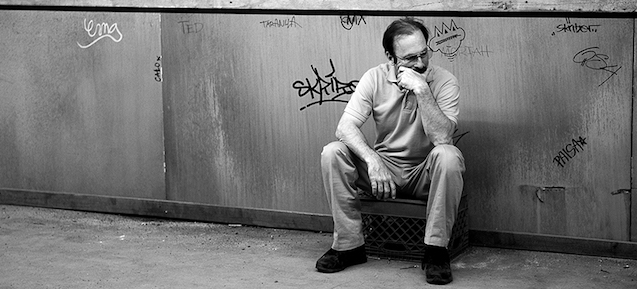
Another wonderful piece by Charis Hamiltonius, continuing from last week’s entry on Luther and Paul.
“Shall we continue in sin in order that grace may abound?” This rhetorical question, dropped in the middle of Paul’s lengthy argument in Romans against a Law-oriented life, is not without merit. If grace is freely given to the ungodly, if the moral ordering of the universe is upside-down, and if our works have no bearing on our righteousness before God, then a reader of Paul’s letter would understandably wonder whether Paul cares about morality at all. To this question, Paul emphatically says, “HELL NO!” But why? If the Law doesn’t guide or direct our actions, on what basis should the moral structure of our lives be built?
Some would say that the Law does, indeed, still serve such a purpose for Paul (namely Luther, and especially Calvin and the Reformed tradition). I’ll return to this objection at the end, mirroring the structure of Paul’s own argument.

When it comes to Christian living, Paul may have boxed himself in somewhat. Having displaced the Law as the communal standard of righteousness, there were no obvious ethical resources to turn to for his new Jewish sect comprised of hereditary Jews and Gentiles. Paul instead turned to two obvious sources to outline his ethical structure, the activity of the Spirit and the Jesus tradition, with his characteristic emphasis on Jesus’ death/resurrection. While these may appear to be two distinct basis, they represent a unified system. Because the “old self” has been crucified with Christ and raised to new life in him by the Spirit, the life of faith becomes a life modeled after our Christological exemplar by the creative workings of the Spirit (Gal. 2:20). It was the Spirit who raised Christ from the dead and it is the Spirit that gives life to our moral bodies (Rom. 8:11). Therefore, the life elicited by the Spirit through the proclamation Christ’s death/resurrection patterns itself in accordance with this event in response. We live an alien life, always dependent upon the Spirit to lift us out of death into the newness of Christ’s life.
Paul does not ask, “What would Jesus do?” but “What did Jesus do, and what is his Spirit doing now?” There are many places where this connection between Christ and the life of the believer is explicitly drawn. Philippians 2 is an example. Here, the commands “Do nothing from selfish ambition, but in humility regard others as better than yourselves, looking not to yourselves, but to others” are established and enabled by the pattern of the gospel: “for let this way of thinking be in you which was also in Christ Jesus” (Phil. 2:3-5). Elsewhere, Paul implores the Galatians to “walk by the Spirit” rather than the Law (Gal. 5:16-18). Those who walk by the Spirit have crucified the flesh (Gal. 5:24). The language of crucifixion employed here underscores the Christological shape of the fruits of the Spirit previously listed. This Law-free, Spirit-enabled ethos of faith is none other than the fulfillment of the “law of Christ” (Gal. 6:2).
Other sections of Paul’s ethics are less obviously connected to either the Spirit or Christ. Yet the parallels between the these are clear. It’s not simply that the latter chapter of Paul’s letters presume the previous more “gospel” chapters, but that they are informed by these for their content and personal impetus. Here, the paradoxical shape of Jesus’ life-giving death informs the same in believers whose life is not marked by gain, but loss and sacrificial, self-giving love for others. Paul writes for the Romans: to seek the honor of others rather than themselves (12:10), to bless those who persecute them (12:14), to lovingly humble yourself to the situation of others (12:15), to not be haughty, but to associate with the lowly, to consider others wiser than themselves (12:16), to not repay evil for evil (12:17), to show mercy to their enemies (12:19-20), etc.

Paul’s ethics do not derive from the Law, but they also aren’t made up in a vacuum; they are thoroughly informed by his understanding of Christ and the pattern of grace given to the ungodly.
What then of the Law? This is a point to which Paul always turns amid his arguments to demonstrate that his Law-free ethics are not opposed to the essence of the Law, understood as love of neighbor. Having laid out his Christ-shaped ethical worldview, Paul then claims that the one who is guided by Christ through the Spirit actually fulfills the Law (Gal. 5:13-14, Rom. 13:8-10), a position anticipated in Romans 3:31. This rhetorical move seems odd at first. Why build up what he previously destroyed? In doing so, Paul presents a water-tight defense of his gospel against possible accusations of entirely forsaking his Jewish identity.
This approach was not necessarily a novel one in Jewish thought. By retrospectively building a bridge from the Spirit-derived life of faith to the Law, Paul’s apologetic strategy parallels that of his Jewish contemporary, Philo of Alexandria. Philo similarly built a bridge from Jewish Law observance to the contemporary philosophical virtues, saying that obedience to the former fulfills the latter. He wrote: “To one who understands how to apply himself to philosophy in a genuine, honest spirit, and who lays claim to a guiltless and pure piety, God gives that most beautiful and holy commandment” (Decal. 58). Philo is certainly more detailed in his apology than Paul, but the similarities between the two are revealing. By building a bridge from Moses to philosophy, Philo seeks legitimization of Judaism within the Greco-Roman world; Paul, likewise, seeks validation for his Law-free ethic from his Law-abiding Christians.
Paul’s ethics are almost intentionally vague and lack the detailed prescriptions indicative of the Law. They fail to answer the concrete question, “What am I to do when I wake up in the morning?” and replace it with the basic question, “What is the most loving thing to do?” Perhaps that’s why the Corinthians got it wrong so many times. The freedom to love after Law can easily be twisted or misapplied.
What all this means in practice can feel both freeing and terrifyingly adrift. To those who live amid a cacophony of laws (read: expectations), the imperative to live by the Spirit as Christ loved is surprisingly judgment free and fills one with a newfound creativity. If our old life was heavy-laden by the demand (“I must do”), the new life in the Spirit lifts this crushing burden of responsibility. For others, though, the inexactness of Paul’s prescriptions can be heard as frustratingly imprecise, like taking a road trip without a destination set in Google maps. But perhaps that’s Paul’s whole point. Living a life of love without a road map to do so forces one squarely into a place where the guidance of the Spirit is most needed. The aimlessness of a life without a law to direct your actions is one that cannot be manipulated by our need for control or moral superiority. By its very nature, a law-free life of faith necessitates a constant returning to its Source for both guidance and motivation. We live, in Luther’s words, a vita passiva (passive life) marked by a continual need for the intervention of the Spirit: “We are beggars: this is true.”

COMMENTS
One response to “Is There Life After Law? A Few Reflections on Pauline Ethics”
Leave a Reply













Thanks a ton!
“But perhaps that’s Paul’s whole point. Living a life of love without a road map to do so forces one squarely into a place where the guidance of the Spirit is most needed.”
Does hearing Pauls commands as frustratingly imprecise betray our legalistic/self-justifying/need for control (Adamic) estate? If so does this also imply that those commands function like law?
In a similar fashion isnt “living a life of love without a road map” akin to proclaiming people are free from Gods law? If so, am I right in assuming you are suggesting that in proclaiming the freedom we have from the law, the Spirit is at work in bringing us to a realization of our need for his guidance (death), and motivating us via the gospel toward a life conformable to Christ, in some small way?